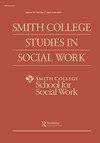涉水:以生殖正义为中心的社会工作教育、实践和组织建议
IF 0.9
Q2 SOCIAL WORK
引用次数: 0
摘要
在这篇文章中,我们将探讨社会工作教育者和从业者应该如何看待和回应最高法院推翻罗伊诉韦德案的裁决。我们首先通过描绘有色人种对个人、家庭和社区的安全和福祉的影响,概述社会工作领域的利害关系。我们的分析还表明,法院的裁决对数十年来以有色人种妇女为首的以生殖正义为基础的理论和组织实施认知暴力的方式。将生殖正义(RJ)框架应用于社会工作教育委员会(CSWE)能力,我们确定了社会工作者在微观、中期和宏观层面的实践领域,以破坏生殖压迫模式,包括限制堕胎。我们相信,每一位社会工作者在创造解放临床社会工作实践中都扮演着独特的角色。通过在社会工作教育和实践中集中生殖正义和去殖民主义思想,我们可以开始提出不同的问题,并尝试新的策略来建立安全和更支持性的环境。关键词:生殖司法微观、中期和宏观解放非殖民化社会工作教育披露声明作者未报告潜在的利益冲突。注1在本文中,我们将使用“女性”、“女性”、“性别扩张的人”、“分娩的身体”和“怀孕的人”等术语,以承认许多不同的身体和人受到对身体自主和生殖自由的威胁。我们发现有必要指出,出生时的性别分配并不能决定一个人在制造和照顾新人类和/或(再)生产能力方面的经历。本文章由计算机程序翻译,如有差异,请以英文原文为准。
Wade in the Water: Suggestions for Centering Reproductive Justice in Social Work Education, Practice, and Organizing
ABSTRACTIn this article, we grapple with how social work educators and practitioners should hold and respond to the Supreme Court’s ruling to overturn Roe v. Wade. We begin by outlining what is at stake for the social work field by mapping the impact on the safety and well-being of individuals, families, and communities of color. Our analysis also makes visible the ways in which the Court’s decision has enacted epistemic violence to decades of reproductive justice-based theorizing and organizing spearheaded by women of color. Applying a reproductive justice (RJ) framework to the Council for Social Work Education (CSWE) Competencies, we identify areas within micro-, mezzo-, and macro-level practice for social workers to disrupt patterns of reproductive oppression, including restrictions on abortion. We believe that every social worker is situated to play a unique role in creating liberatory clinical social work practices. By centering reproductive justice and decolonial thinking in social work education and practice, we can begin to ask different questions and try new strategies to build safe and more supportive environments.KEYWORDS: Reproductive justicemicro, mezzo, and macroliberationdecolonial social work education Disclosure statementNo potential conflict of interest was reported by the author(s).Notes1 Throughout this article, we will use the terms women, femmes, gender-expansive people, birthing bodies, and pregnant people to acknowledge that many different bodies and people are affected by threats to bodily autonomy and reproductive freedom. We find it imperative to name that assigned sex at birth does not determine one’s experience surrounding the making and caring for new human beings and/or ability to (re)produce.
求助全文
通过发布文献求助,成功后即可免费获取论文全文。
去求助
来源期刊

SMITH COLLEGE STUDIES IN SOCIAL WORK
SOCIAL WORK-
CiteScore
1.50
自引率
10.00%
发文量
10
期刊介绍:
Smith College Studies in Social Work focuses on the vital issues facing practitioners today, featuring only those articles that advance theoretical understanding of psychological and social functioning, present clinically relevant research findings, and promote excellence in clinical practice. This refereed journal addresses issues of mental health, therapeutic process, trauma and recovery, psychopathology, racial and cultural diversity, culturally responsive clinical practice, intersubjectivity, the influence of postmodern theory on clinical practice, community based practice, and clinical services for specific populations of psychologically and socially vulnerable clients.
 求助内容:
求助内容: 应助结果提醒方式:
应助结果提醒方式:


